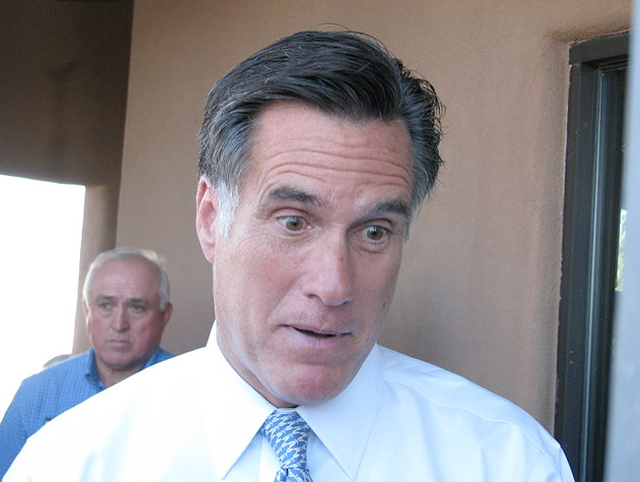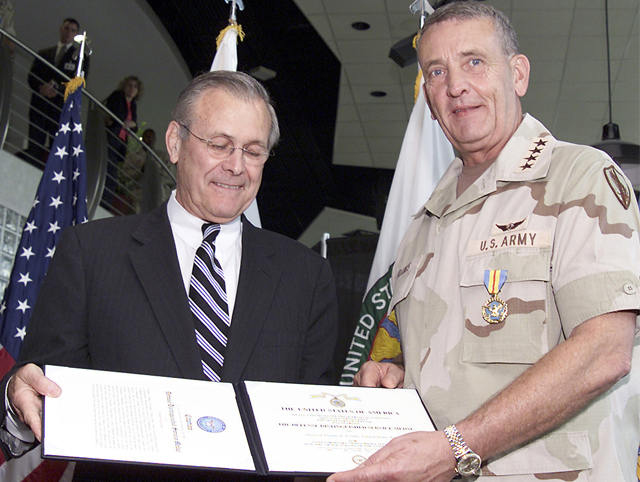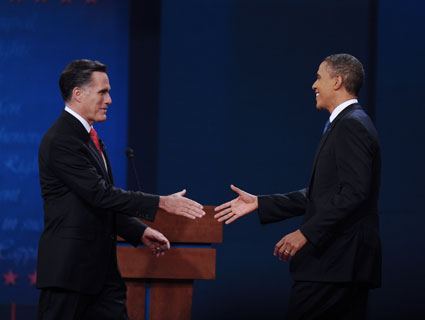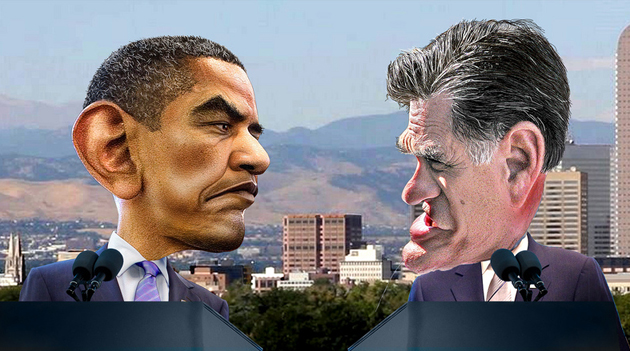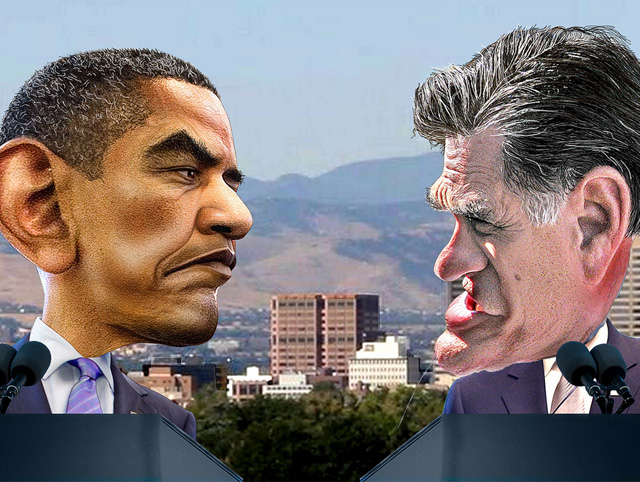
<a href="http://www.flickr.com/photos/donkeyhotey/8043836343/sizes/h/in/photostream/">DonkeyHotey/Flickr</a>
The last presidential debate of 2012, which is scheduled for Monday evening, is focused on America’s big international concerns. Here’s your topic-by-topic primer.
General Foreign Policy
Behind closed doors in that “47 percent” fundraiser caught on video, Mitt Romney said he hoped for an Obama foreign policy crisis to exploit in the election: “…in the Jimmy Carter election, the fact that we have hostages in Iran, I mean, that was all we talked about. And we had the two helicopters crash in the desert, I mean that was the focus, and so [Reagan] solving that made all the difference in the world…by the way, if something of that nature presents itself, I will work to find a way to take advantage of the opportunity.”
Iran
Two years before the “Arab spring,” Iran had to deal with its own internal tumult. Since then, Iranian President Mahmoud Ahmadinejad’s regional saber-rattling and his push for a nuclear weapons program led to a showdown with America in the Persian Gulf this spring, which the White House ultimately used to impose the harshest global economic sanctions ever put on Iran. That’s a strategy that, so far, has been turning out pretty well from a geostrategic standpoint—though not so much from a humanitarian perspective.
Mitt Romney wants harsh sanctions and maybe war against Iran. He seems confused about sanctions, though. The 47 percent video also showed that he’s confused about the difference between an atomic weapon and a dirty bomb. Romney’s fellow Republicans also seem unclear on the fact that Iran doesn’t have any intercontinental ballistic missiles to deliver nukes.
Israel
In that 47 percent fundraiser, Mitt Romney trashed the two-state solution, called Mideast peace “almost unthinkable,” and said his Israel-Palestine policy amounted to “we kick the ball down the field and hope that ultimately, somehow, something will happen and resolve it.” Romney has also intimated that as president, he would back an Israeli military strike against Iran.
Libya
What are we even doing in Libya, anyway? It started in February 2011, and Mother Jones can explain it all.
Kevin Drum has a short explainer on the Libya attacks, but here’s a little more info: This past September 11, the US consulate in Benghazi, Libya, was attacked by militants, killing four Americans—including the US ambassador to Libya, Chris Stevens. Romney immediately assailed the administration for…well, it’s unclear what for, really. But he, too, has “apologized for America” on this issue, and his line of attack against the president didn’t work out so well for him in last week’s debate. Nevertheless, some hard questions remain for the Obama administration about the lead-up to the Benghazi attacks and the White House’s response.
Meanwhile, as Adam Serwer has found, if Mitt Romney wants to argue that Republican presidents keep diplomats safer, he’s on extremely shaky ground.
China
On the campaign trail, Romney has insisted that China is stealing US jobs and weakening the dollar, and as president he’d get China to “stop cheating.” Yet back in July, Mother Jones broke the news that while at Bain Capital, Romney invested heavily in a Chinese firm that pioneered the “outsourcing” of US jobs. Between 2008 and 2011, Romney also invested more than a half million dollars of his personal wealth in the stocks of 10 Chinese companies—including firms that embezzled, partnered with Iran, and stole US intellectual property. Similarly, Paul Ryan’s brother Stan works for Cargill, an agribusiness giant, and is working hand in glove with the Chinese government to industrialize China’s agriculture, regardless of the costs to the environment and US domestic suppliers.
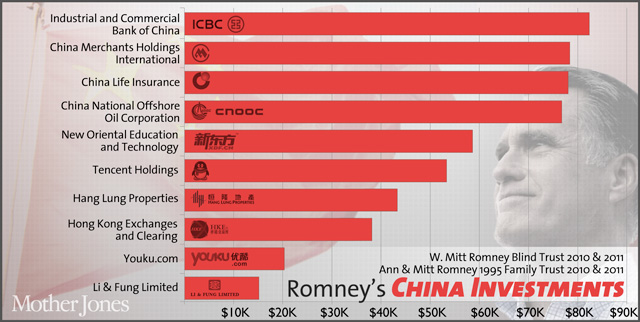
Bin Laden/Al Qaeda
Osama bin Laden is dead. He was killed in Pakistan in May 2011 in a Navy SEAL raid ordered by President Obama. Yet Republicans accuse Obama of “spiking the bin Laden football,” and they continue to spread lies and rumors about the raid. It’s gotten to the point where a sizable chunk of Republicans in a vital swing state believe Mitt Romney, who was a private citizen in May 2011, deserves thanks for killing bin Laden.
After bin Laden’s death, Al Qaeda was quickly rolled up, largely due to intelligence gathered during the bin Laden raid. US drones in Yemen also killed Qaeda-connected cleric Anwar al-Awlaki, which was potentially legally problematic, since Awlaki was a US citizen. That action has shined a spotlight on “extrajudicial killings“—America’s continued use of drones to target suspected terrorists, especially Americans, without trials.
Foreign Aid
Mitt Romney and Paul Ryan have both attacked the United States’ foreign aid budget. Yet the entire international affairs budget requested by President Obama for 2013—that includes all funding for the State department, US AID, and other commercial and diplomatic support—amounts to $56 billion—about 5 percent of the military budget, and far less than the annual cost of Bush-era tax cuts on the wealthy.
Afghanistan
The US still has troops in Afghanistan, 11 years after the initial post-9/11 invasion. More than 2,000 American service members have now died there. Here’s what the war looks like today, in helmet-cam form. Mitt Romney has attacked President Obama for setting a 2014 timetable to withdraw US forces from Afghanistan; given Romney’s campaign support from a key military architect of the Iraq and Afghanistan wars, it’s safe to guess that Romney might like a continued US military presence there.
Syria
On the heels of the Arab spring in the Middle East, Syrian dictator Bashar al-Assad began a crackdown against pro-democracy dissidents in March 2011. The situation has devolved into a costly civil war, and thousands have died. Mother Jones also learned that the Assad government has been making a hit-list of dissidents, and relying on US technology to crush them. Romney and the Republicans have assailed Obama for not doing more to topple Assad, but Romney’s been hit for being hawkish while lacking any specific course of action.
The Size of the US Military
There’s reason to believe that despite his hand-wringing over the national debt, Romney would actually increase spending on military hardware. He complains about the size of the Navy, rails against the age of US military tanker aircraft, and pledges to spend 4 percent of GDP on defense (a move that could cost Americans another $2.1 trillion dollars). Just last week in a foreign policy speech carefully designed to boost his credibility as a possible commander in chief, Romney vowed that he would “restore our Navy to the size needed to fulfill our missions by building 15 ships per year.” That’s a nearly 70 percent boost over current shipbuilding levels—hardly the hallmark of a fiscal conservative.
The Euro Crisis
You think the recession was bad here? Check out what’s going on in Europe. Kevin Drum has a basic explanation here. Drum thinks the eurozone is still in pretty dire straits, though that hasn’t stopped the European nations from taking the lead on clean energy investments, even as US investment has declined.
Climate Change
Climate change is a global issue, and it’s potentially a big driver in this election cycle. Romney, for his part, has mockingly joked about global warming and hired a spokeswoman who promoted climate change denial on behalf of Exxon. Obama has responded that climate change is not a hoax, and extreme weather is not a joke.
